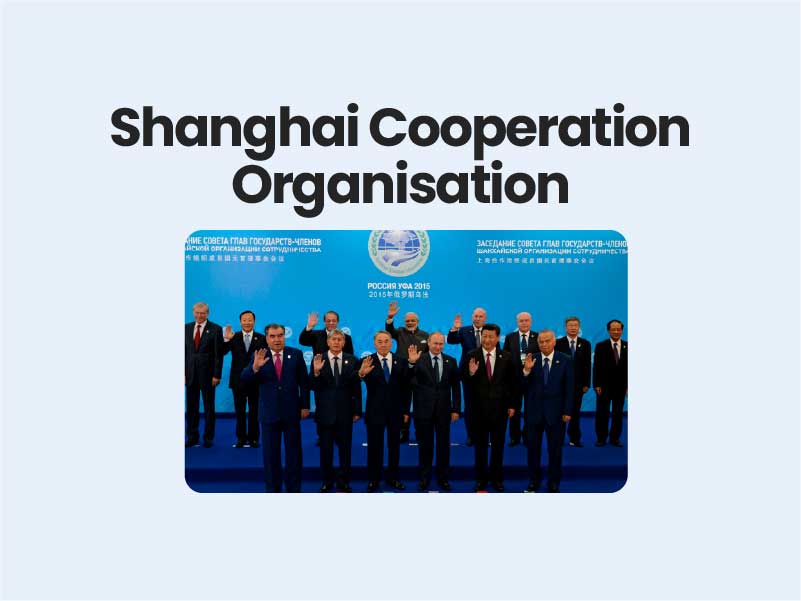Companion@360 → 7 Month programme to sharpen your writing skills → REGISTER NOW

Shanghai Cooperation Organisation (SCO)
The Shanghai Cooperation Organisation (SCO) is a eight-member multilateral organization, established on 15 June 2001 in Shanghai, China by the leaders of China, Kazakhstan, Kyrgyzstan, Russia, Tajikistan and Uzbekistan. These countries, except for Uzbekistan, had been members of the Shanghai Five group, formed on 26 April 1996 with the signing of the Treaty on Deepening Military Trust in Border
Significance:
- The SCO has established relations with the United Nations in 2004 (where it is an observer in the General Assembly), Commonwealth of Independent States in 2005, Association of Southeast Asian Nations (ASEAN) in 2005, the Collective Security Treaty Organization in 2007, the Economic Cooperation Organization in 2007, the United Nations Office on Drugs and Crime in 2011, the Conference on Interaction and Confidence-Building Measures in Asia (CICA) in 2014, and the United Nations Economic and Social Commission for Asia and the Pacific in 2015 (ESCAP), United Nations Educational Scientific and Cultural Organisation (UNESCO) in 2018.
- “It will be the first time that a summit-level meeting will be held under India’s chairmanship, since it gained full membership of the organisation in 2017,”
- SCO has two Permanent Bodies – (i) SCO Secretariat in Beijing and (ii) Executive Committee of the Regional Anti-Terrorist Structure (RATS) in Tashkent. The Chairmanship of SCO is by rotation for a year by Member States. Presently Russia is the Chair of SCO for 2019-20.
- The Council of Heads of States is the apex decision-making body in the SCO. This Council meets at the SCO summits, which are held each year in one of the member states’ capital cities. The Council of Heads of Governments is the second- highest council in the organization.
- The Secretariat of the SCO is the primary executive body of the organization. It serves to implement organizational decisions and decrees, documents (such as declarations and agendas), functions as a document depository for the organization, arranges specific activities within the SCO framework, and promotes and disseminates information about the SCO.
- The official working languages of the Shanghai Cooperation organization are Chinese and Russian.
- The position of Dialogue Partner was established in 2008 in accordance with Article 14 of the SCO Charter of 7 June 2002.
- Presently the dialogue partners of SCO are Armenia, Azerbaijan, Cambodia, Nepal (was granted dialogue partner status in the SCO at 2015 summit, Ufa, Russia), Sri Lanka (was granted dialogue partner status at the SCO at 2009 summit,Yekaterinburg) and Turkey (a member of NATO, was granted dialogue partner status at the SCO at 2012 summit, Beijing).
Objectives of Shanghai Cooperation Organisation (SCO):
- Strengthening mutual trust and neighbourliness among the member states.
- Promoting effective cooperation in -politics, trade & economy, research & technology and culture.
- Enhancing ties in education, energy, transport, tourism, environmental protection, etc.
- Maintain and ensure peace, security and stability in the region.
- Establishment of a democratic, fair and rational new international political & economic order.
India and SCO
- India was granted Observer status at the July 2005 Astana Summit, and subsequently participated in all SCO forums open to Observers. India formally submitted an application for the full membership to the then SCO Chair, Tajikistan, prior to the SCO Summit in Dushanbe in September 2014. Thereafter, the next SCO Summit in July 2015 in Ufa (Russia), declared the initiation of the process of accession of India’s (and Pakistan’s) full membership in SCO.
- The MOO outlined various obligations to be fulfilled by India in a sequential step-by-step and time bound manner to obtain full membership. As per the obligations under MOO, India had acceded to 34 SCO Agreements including the SCO Charter and Shanghai Convention on Combating Terrorism, Separatism and Extremism and 3 additional SCO Agreements that entered into force after signing the MOO.
- India’s entry into SCO as a full member since 9 June 2017, has been further activated with the establishment of the SCO Division in MEA and appointment of National Coordinator and Permanent Representative to SCO.
- India took part in an anti-terror drill of the Shanghai Cooperation Organisation (SCO) from August 22 to 29, 2018 in Chebarkul, Russia. The exercise involved tactical level operations in an international counter insurgency or counter terrorism environment under the SCO Charter. This was the first time India participated in the SCO military exercises since becoming a full member of the SCO in June 2017.
- A total of 22 outcome documents were signed including the Joint Communique and Appeal to Youth against radicalization. Other documents pertained to Prevention of Narcotics Abuse, Environmental Protection, Fight against threat of Epidemics, Trade Facilitation, MSMEs, Customs and Tourism. Plan of Action for SCO Treaty on Long term Good Neighbourliness, Friendship and Cooperation for 2018-2022 and Protocol on the SCO-Afghanistan Contact Group were also signed.
Challenges:
- Cross-border terrorism
- Diplomatic challenges
- Security challenge
- Trade
- The growing closeness of Russia and China
“The SCO was created as a regional organisation to tackle peace and security, to tackle the challenges of terrorism, extremism and separatism, and to promote trade and cooperation and cultural partnerships,”.
“That is why Article 2 of the SCO charter specifically prohibits bilateral issues from being raised, because it only serves to vitiate the atmosphere”.
Which is the best UPSC Test Series ? Check Now
